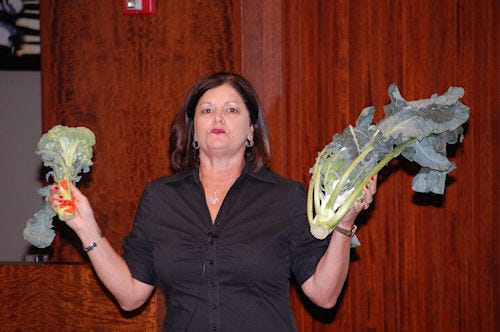September 27, 2011

Bring up Monsanto's seed business and most will assume you're talking about corn and soybeans.
What many may not realize is Monsanto's been making inroads into the vegetable seed business since it purchased Seminis in 2005. As most would expect, they're focused on bringing advanced breeding techniques and transgenic traits to vegetable growers. During Monsanto Media Days, Consuelo Madere, vice president of the global vegetable seeds division, discussed this growing business venture.

ADVANCED BROCCOLI: Consuelo Madere showcases a new broccoli variety under development at Monsanto. Unlike conventional varieties, the broccoli head pushes past the leafy canopy. This allows growers to harvest the crowns more rapidly. The additional sunlight provides a greener head.
The company currently is marketing vegetable seed in 160 countries. Seminis is the largest brand, but there are several others which were acquired in 2007 (Western Seed, Poloni and Peotec) and 2008 (De Ruiter). Monsanto currently sells seed for 23 different crops.
Focusing on taste
When the company first entered the vegetable business, Madere says they worked with focus groups to pinpoint the direction their research and development should take. Rather than working on drought tolerance, insect protection or weed suppression, the biggest area open for improvement based on grower response is making vegetables taste better.
According to the Center for Disease Control, less than 25% of U.S. adults consume the recommended servings of fruits and vegetables each day. With much of a grocery store's produce section harvested miles away from the point of sale, developing better tasting, yet transportable, varieties are top priority.
To do so, Madere explains they are delving into the chemical composition of vegetables. For example, with a tomato, the mix of acid and sugars are the determining factor in taste. The trick, using laboratory science, is to put the taste of a fresh-picked garden tomato in the hands of consumers, even in the dead of winter.
Breeding, not biotech
Those familiar with the Monsanto story know that biotech traits have propelled the company to unforeseen levels of market share. Don't expect a repeat of the biotech business model in the vegetable seed industry.
Less than 5% of the vegetable research budget is spent on biotechnology, Madere notes. A staggering 95% is directed toward advanced breeding.
Madere says the decision all comes down to market size. With 91 million acres of commodity corn in the U.S., biotech is a sensible investment. The number of sweet corn acres is somewhere around 250,000. Investing $100 million and 10 years' worth of pipeline research just doesn't pan out with the market demand.
That said, some of Monsanto's earlier work in biotech corn does transfer to sweet corn. However, the market potential for the other 22 vegetable crops still makes advanced breeding the development tool of choice.
"Advanced breeding is typically more cost effective and it takes less time," Madere adds.
Monsanto's vegetable crop pipeline
Sweet-Peak honeydew melons: Perhaps the toughest part of picking the melon is determining if it's at the peak of ripeness. The Sweet Peak is a honeydew melon whose skin turns from a greenish white to creamy yellow when it's ripe. Growers can be confident in sending ripe melons to market, guaranteeing repeat customers.
Seminis Easyharvest broccoli variety: As traditional broccoli varieties develop, the broccoli head is enveloped in the leafy canopy. The grower must push back the canopy to check on developmental status. With Monsanto's new variety, the head grows above the canopy with a clean stem and uniform maturity. This makes it easier to harvest. It also produces a greener broccoli head, which consumers prefer.
Seminis Performance Series sweet corn: Biotech insect-protected sweet corn has actually been around for more than 10 years in the U.S. Unlike previous biotech offerings, this triple stack will protect against above and below ground insects. Plus, it provides the convenience of glyphosate tolerance. The new product is intended for the fresh market and will be available this fall.
You May Also Like




